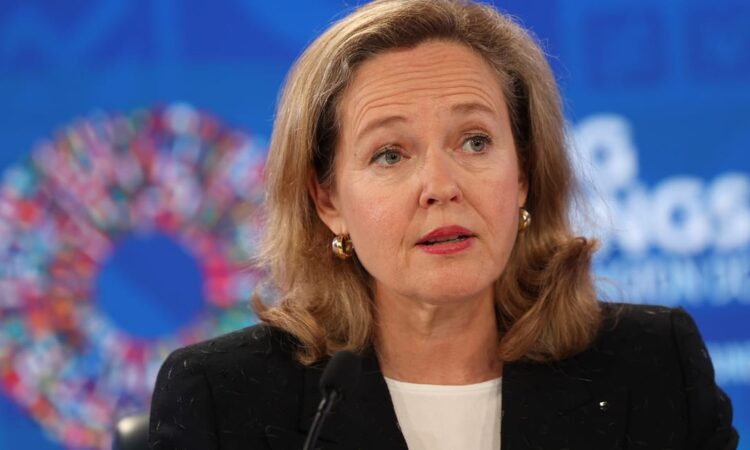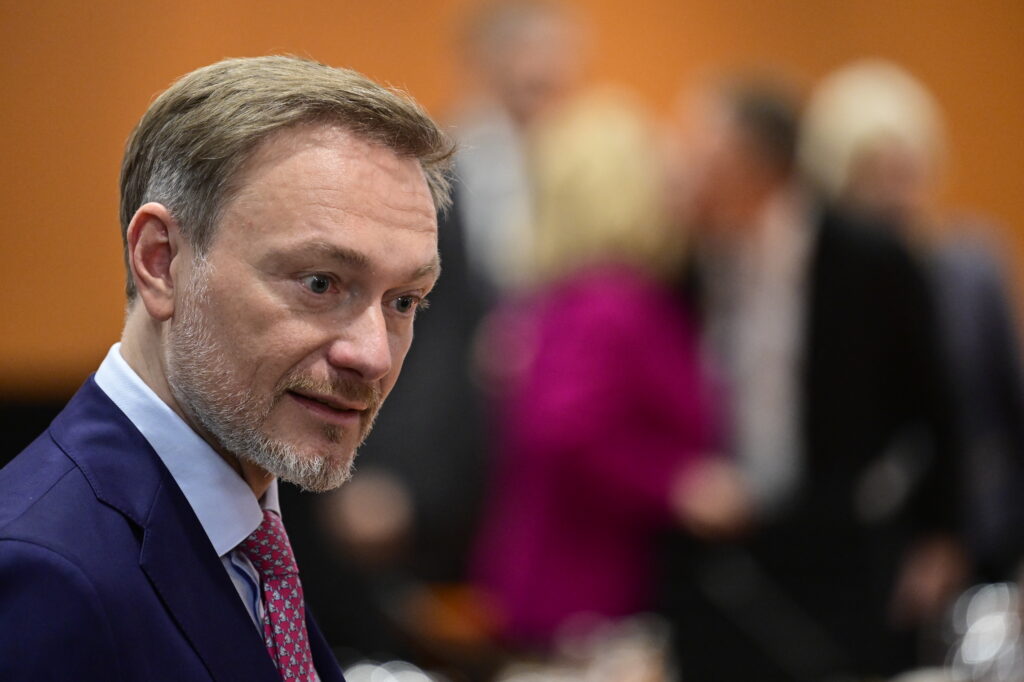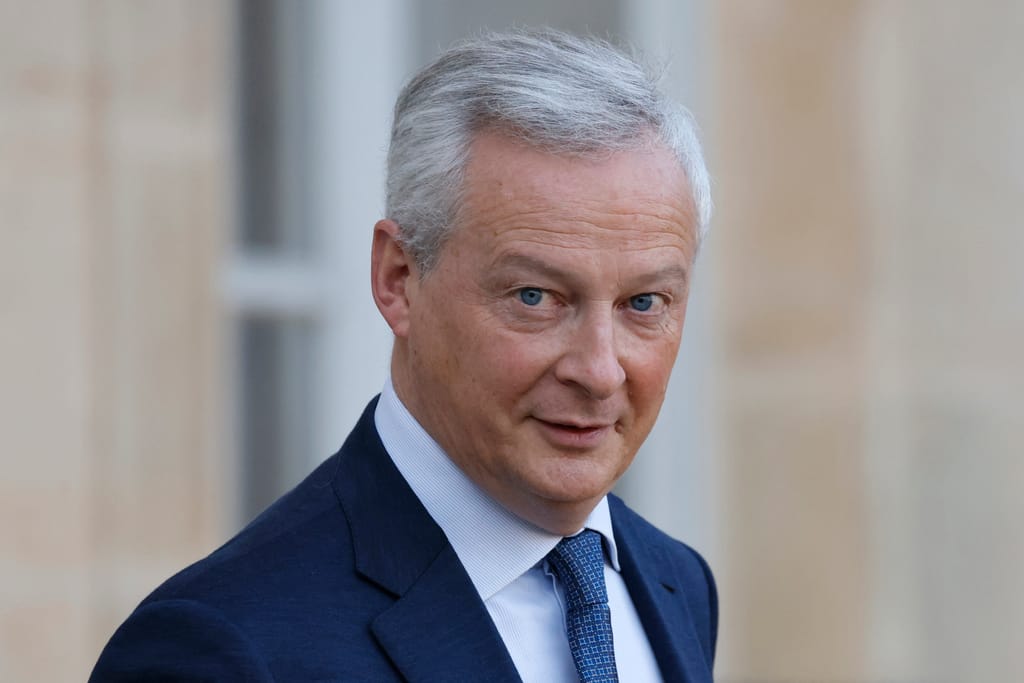
Press play to listen to this article
Voiced by artificial intelligence.
BRUSSELS / PARIS ― When the VIP vending machine broke down in the early hours of the morning near the Brussels high-security room where the EU’s 27 finance ministers were locked in fraught negotiations, the symbolism was all too obvious.
The EU catering staff had long called it a day. The ministers and their teams, used to powering through on Mars bars and Coca-Cola, had to face up to a long night trying to get a historic deal reforming national spending rules while parched and hungry. Dinner had been a disappointing meal of cold cod and mediocre white wine. And besides, that had been hours ago.
But just as the arduous negotiations themselves proved, you can always rely on a solution turning up somehow.
In this case, as one bereft leading official stood in front of the machine ― “you need a high level of blood sugar for these all-nighters,” he lamented ― a second senior participant discovered a trick: certain foreign credit cards would spark the thing back into life.
The sudden raising of the spirits wasn’t enough to get an agreement that night ― finance ministers eventually went back to their hotels around 3 a.m. on December 8 ― but after months of deadlock they had found a way forward. Two weeks on, and after a virtual meeting on Wednesday, the deal, radically reforming how EU governments have to rein in debt and deficit, was done.
This account, of tortuous negotiations that reached as far as Brazil, of finance ministers shooting each other sarcastic jibes, of the talks’ chair being called out after a chuckle … and yet more cold fish, is based on interviews with 25 officials and politicians, all of whom spoke to POLITICO on condition of anonymity because of the confidential nature of the process.
France vs. Germany
Barely three months earlier, had you asked national treasury officials about the possibility of agreement on this, one of the most significant pieces of work of the year for the EU, they might have laughed. Rules over how much countries can spend, known as the Stability and Growth Pact, go to the heart of the bloc’s deepest and oldest fault-line, dividing north against south, rule-followers against rule-benders, tightwads against the spendthrift.
And Germany, as it has for more than a generation, led a band of skinflints that wanted there to be tough across-the-board debt-reduction requirements and numerical targets. France, Italy and co., the countries that would be most affected by stricter rules, wanted bespoke plans drafted in cooperation with the European Commission that would give them more time to get debt and spending under control.
What’s more, the finance ministers were racing against time. Unanimity was needed and a deal by Christmas was necessary to allow agreement on the new framework with the European Parliament before its election in June.
“It would affect the credibility of the European Union if we can’t deliver on this, no matter how difficult it is,” Dutch Finance Minister Sigrid Kaag, whose government allied with the Germans, told POLITICO in an interview this week.
Honest broker?
One woman is central to the story, even if the precise nature of her influence is in some dispute. As finance minister of Spain, the country that held the presidency of the EU for the latter half of the year, Nadia Calviño chaired each formal round of negotiations.
But at the same time, she was bidding to become the next chief of the European Investment Bank ― a top EU job voted for by precisely the same finance ministers who were struggling to find a compromise on the spending rules. It resulted in some countries not-so-subtly claiming she may have been quicker to accept some governments’ arguments in the negotiations in order to win their backing for the EIB.

The talks were “polluted by the EIB [race],” one government official said earlier this month.
Italian Finance Minister Giancarlo Giorgetti didn’t mince his words either. “If Daniele Franco [the Bank of Italy official also in the running for the EIB] had been finance minister he could have played the game better,” he told reporters.
The accusations of bad faith are something the Spanish government, and others, vehemently deny. Calviño did eventually get the job, receiving backing from her peers at the same meeting in December as when the vending machine malfunctioned.
Chalk and cheese
It’s little wonder the Italians were griping. As the negotiations unfolded, Germany seemed to manage to toughen up the reform with every new iteration of the Commission’s initial April proposal. Italy, the second most highly indebted country in the bloc, therefore had much to lose.
By the summer, governments were no nearer bridging their differences and officials were getting jittery.
A meeting in July “showed that this deal was difficult but possible,” Calviño told reporters on Wednesday in answer to a question from POLITICO, but officials knew there was a rocky road ahead.
In September, the traveling negotiation circus stopped in the ancient cathedral city of Santiago de Compostela, in Calviño’s home region of Galicia. Nothing would have looked better than to herald progress in such a symbolic venue. But there wasn’t any.
And there was worse to come. When they reconvened in less-symbolic Luxembourg a month later, the two main camps were still “like chalk and cheese,” according to one official present. Tensions were running high.
At one point, when German Finance Minister Christian Lindner challenged Calviño’s assertion good progress was being made, warning of a no-deal outcome, the Spaniard, apparently in an attempt to lighten the mood, ironically thanked Lindner for his “constructive” position with a chuckle. Harald Waiglein, the Austrian Finance Ministry director general, called her out. “There are different ideas of constructiveness around the table,” he told her.
Something had to give.
So Paris and Berlin took matters into their own hands, swinging into action and effectively sidelining Calviño. The leaders of the two camps would force through a deal themselves.
Poisson froid / Kalter Fisch
In the second week of October, the governments of Germany and France, including Chancellor Olaf Scholz and President Emmanuel Macron, met for a two-day retreat in the northern German port city of Hamburg in an effort to reset relations between their two countries.
It was here that the two leaders munched their way through more cold fish ― the local delicacy of Baltic herring rolls ― and, while it wasn’t made public that the spending rules reform was on the agenda, let alone that there had been a meeting of minds, it seemed like a switch had been flicked. Finally they could see the contours of a deal.

As Lindner acknowledged in early December: “France and Germany have been working intensively together for about two months.”
What followed the Hamburg retreat was an intensive period of diplomacy in which the finance ministers of France, Germany and Italy met in Paris and Berlin, held countless phone calls and reported back to Brussels and Madrid. The Spanish held more than 50 bilateral meetings with governments in the month from early November.
As the catalyst of the deal, “I would identify the first meeting that happened between [French Finance Minister Bruno] Le Maire and minister Lindner and the public commitment that came out of that,” Paschal Donohoe, the former Irish finance minister who as leader of the group of eurozone-only finance chiefs was party to the talks, told POLITICO. “That was a really important injection of momentum into the process at a time when that was needed.”
We can come for dessert, yeah?
However, the French-German initiative merely threw up more bad blood. After all, this was supposed to be an agreement between 27 governments, not just the most powerful two.
The frustration got the better of a few when, at a breakfast for finance ministers in Brussels in early November, France’s Le Maire, over croissants and orange juice, reassured his peers that he and his German counterpart would iron out the EU’s differences over dinner.
That didn’t go down well.
According to officials present, Sweden’s minister said she could perhaps come for coffee. The tone was dripping in irony.
Her Slovenian counterpart asked whether he could join for dessert.
“We’re not happy with French and German bilateral chats, ” said a diplomat from one country. “It’s a bitter pill to swallow.”
Others tried to put a brave face on it. “I don’t think you can say it’s been a Franco-German constellation and that they got everything,” Danish Finance Minister Stephanie Lose told POLITICO in early December. “A lot of countries participated.” A French Economy Ministry official also rejected those criticisms, stressing that other EU countries urged Paris and Berlin to agree among themselves.
The Spanish, meanwhile, were scrambling to take whatever they were getting from Berlin and Paris and checking in with other capitals to see how receptive they were. Diplomats from other countries alleged a lack of organization and said they were frustrated over Madrid’s methods, which lacked structure. Again, officials from Spain dismiss these accusations.
Spain’s strategy didn’t win many more admirers once finance ministers arrived in Brussels in December to try to clinch the deal. Calviño and Treasury chief Carlos Cuerpo would disappear for hours, leaving ministers to bide their time in the main room, returning with draft amendments that included mistakes and typos that diplomats had to correct by hand, officials said.
Final stretch
And so to Brazil.
The intensive French-German talks had started to bear fruit, And while they couldn’t quite get a deal over the line after eight hours of negotiation on the night of the faulty vending machine in Brussels, they were close.
As if to prove that they weren’t still quite eye-to-eye, Le Maire said Paris and Berlin agreed on 95 percent of the text, only to be corrected a few minutes later by Lindner, saying it was 92.
But it needed a final push. Away from prying eyes, in Brasilia, where treasury officials were meeting for a gathering of the G20 group of the world’s richest nations, France’s Treasury chief Emmanuel Moulin and his German counterpart Heiko Thoms dotted the Is and crossed the Ts.
It was all over bar the shouting.
Le Maire and Lindner dined on Tuesday night at the French economy ministry in a rainy Paris. The deal was officially done when all 27 finance ministers held a video call the following day.
The agreement allows both camps to claim victory. Some strict, uniform targets for debt and deficit reduction please the German-led group of governments. But for the other side, the rules are much more flexible than they once were.
The French-German axis was “an important step to get to the finish line,” the Netherlands’ Kaag told POLITICO. “I expected it as well, because otherwise you can keep talking to each other forever.”
Barbara Moens contributed to this article from The Hague.






